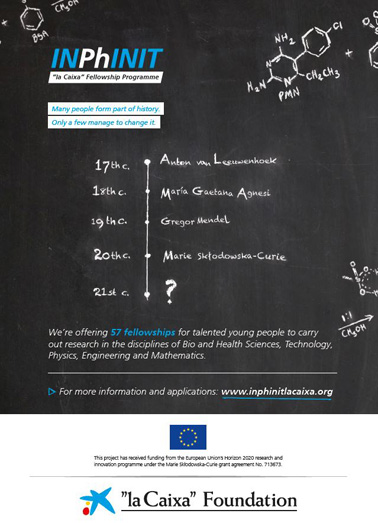The CNIC hosting institution within the INPhINIT “la Caixa” Fellowships Programme
The CNIC as a “Severo Ochoa Centre of Excellence” is a hosting institution within the INPhINIT “la Caixa” Fellowships Programme. The Centre is searching talented and highly motivated young researchers to carry out research projects in the cardiovascular field. ”la Caixa” Foundation firmly believe that, by supporting talent and academic excellence, they can contribute towards the progress of society. A commitment that has positioned them as one of the leading foundations in the world and which, today, They are making even stronger with the launch of INPhINIT.
”la Caixa” Fellowship Programme
INPhINIT aims to revolutionise European doctoral training in terms of its quality, excellence of researchers, scope of the benefits offered and expected impact.
Invest in your talent with INPhINIT and change history.
- 57 fellowships at Spanish Research Centres of Excellence
- 3-year doctoral employment contract
- Personal development career plan
Requirements
At the time of recruitment, candidates must comply with one of the following options:
- To have completed the studies that lead to an official Spanish (or from another country of the European Higher Education Area) university degree awarding 300 ECTS credits, of which at least 60 ECTS credits must correspond to master level.
- To have completed a degree in a non-Spanish university not adapted to the European Higher Education Area that gives access to doctoral studies. The verification of an equivalent level of studies to the ones mentioned above will be made by the university when the admission procedure starts.
To be eligible, candidates must:
- Be in the first four years (full-time equivalent research experience) of their research careers and not yet have been awarded a doctoral degree.
- Not have resided or carried out their main activity (work, studies, etc.) in Spain for more than 12 months in the 3 years immediately prior to the recruitment date. Short stays such as holidays will not be taken into account.
- Have a demonstrable level of English (B2 or higher).
The INPhINIT “la Caixa” fellowships Programme offers:
- 3-year contract
- €34,800 gross annual salary + €3,564 annual additional funding
- Award of €7,500 for the PhD fellow in case he/she presented the thesis within a period of 3.5 years
- Additional training in transferable skills
Deadline for incorporation of candidates: September/October 2017
For more information and applications: www.inphinitlacaixa.org
CNIC Research Groups interested in hosting an INPhINIT “la Caixa” fellow
Jorge Alegre-Cebollada (jorge.alegre![]() cnic.es)
cnic.es)
Vicente Andrés (vandres![]() cnic.es)
cnic.es)
Molecular genetics of angiogenesis -Angiogenesis and Cancer
Rui Benedito (rui.benedito![]() cnic.es)
cnic.es)
Experimental Pathology of Atherosclerosis - Physiological functions of LDL in the arterial wall
Jacob Fog Bentzon (jacobfog.bentzon![]() cnic.es)
cnic.es)
Juan Antonio Bernal (juanantonio.bernal![]() cnic.es)
cnic.es)
Héctor Bueno (hector.bueno![]() cnic.es)
cnic.es)
José Luis de la Pompa (jlpompa![]() cnic.es)
cnic.es)
José Antonio Enríquez (jaenriquez![]() cnic.es)
cnic.es)
David Filgueiras (david.filgueiras![]() cnic.es)
cnic.es)
Enrique Lara (elara![]() cnic.es)
cnic.es)
Functional genomics - Functional Genomics of Cardiovascular Diseases
Miguel Manzanares (mmanzanares![]() cnic.es)
cnic.es)
Pilar Martín (pmartinf![]() cnic.es)
cnic.es)
Pura Muñoz (pura.munoz![]() cnic.es)
cnic.es)
Nuclear receptor signaling - Role of nuclear receptors in cardiac homeostasis and injury
Mercedes Ricote (mricote![]() cnic.es)
cnic.es)
Guadalupe Sabio (gsabio![]() cnic.es)
cnic.es)
Francisco Sánchez-Madrid (fsanchez-madrid![]() cnic.es)
cnic.es)
Immunobiology - Targeting dendritic cells for immunotherapy
David Sancho (dsancho![]() cnic.es)
cnic.es)
Cardiovascular proteomics - Mechanisms of supercomplex assembly and degradation in mitochondria
Jesús María Vázquez (jesus.vazquez![]() cnic.es)
cnic.es)











